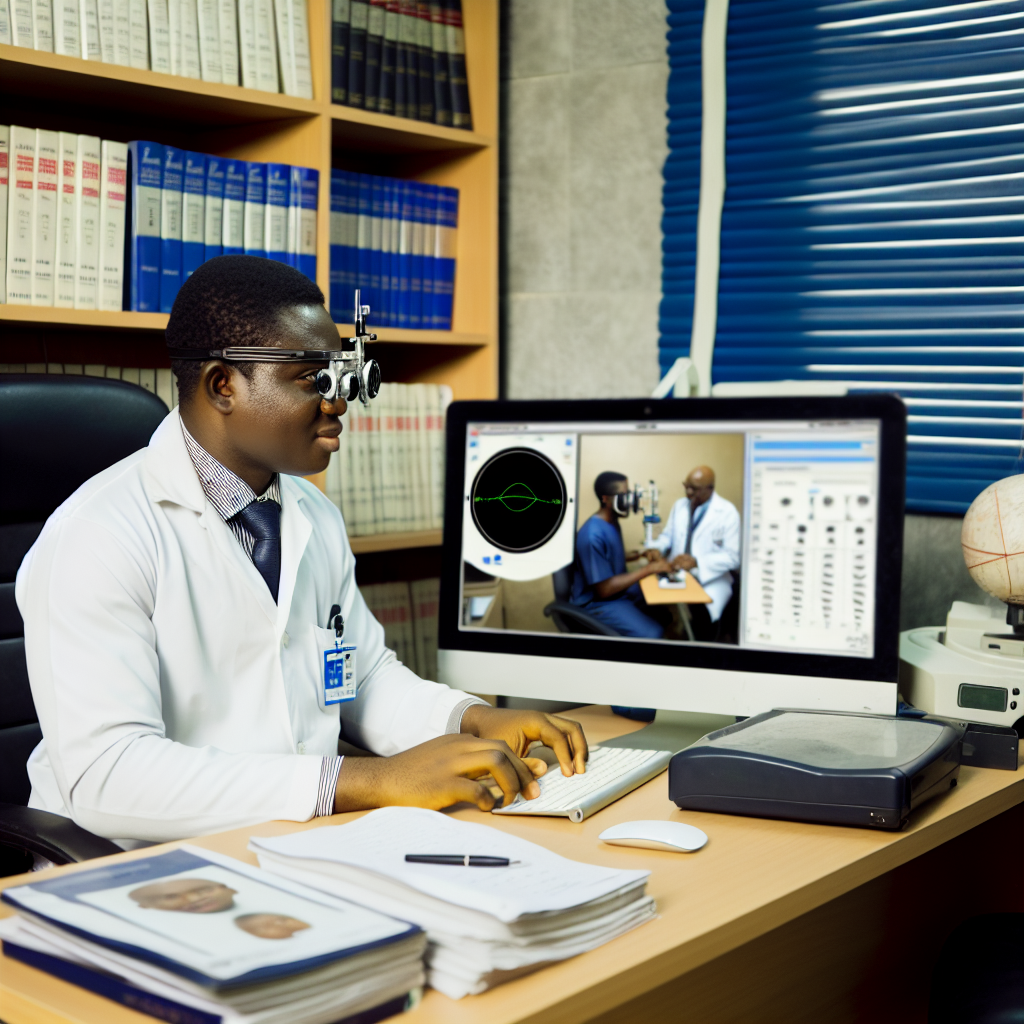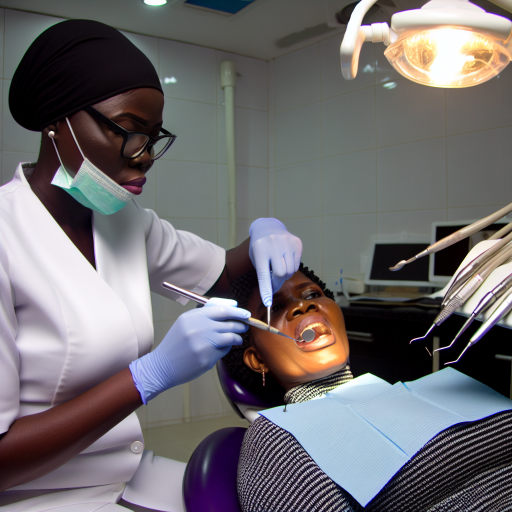Introduction:
Telemedicine is the use of technology to provide healthcare remotely.
This transcends geographical barriers.
Teleophthalmology, a subset of telemedicine, focuses on eye care services through virtual consultations.
In Nigeria, access to specialized healthcare is limited.
Teleophthalmology plays a vital role in addressing this issue.
Overview of Ophthalmology in Nigeria:
In Nigeria, eye diseases are prevalent. Millions suffer from conditions like cataracts and glaucoma.
Accessing ophthalmic care in the country is a significant challenge. This is due to the shortage of specialist eye care professionals.
The lack of infrastructure in rural areas exacerbates the difficulty in providing eye care services. Remote communities struggle to access timely care.
Innovative solutions like telemedicine have become crucial. They help in addressing challenges and improving access to eye care services.
Statistics on the Prevalence of Eye Diseases in Nigeria:
- According to the World Health Organization (WHO), over 4 million Nigerians are visually impaired. Cataracts are the leading cause.
- Common eye conditions include glaucoma, diabetic retinopathy, and refractive errors.
- Blindness prevalence is higher in rural areas compared to urban centers. This highlights disparities in access to eye care services.
Challenges Faced in Accessing Ophthalmic Care in Nigeria:
- There is a shortage of ophthalmologists in Nigeria. Only about 1 ophthalmologist exists per 1 million people.
- The cost of eye care services is significant. Limited facilities make it difficult for many Nigerians to seek treatment.
- Rural communities face significant barriers in accessing eye care. There is a lack of infrastructure and trained professionals.
Importance of Innovative Solutions like Telemedicine:
- Telemedicine offers a cost-effective way to provide eye care services. It is convenient for remote and underserved communities.
- Patients can receive diagnosis, treatment, and monitoring of eye conditions through telemedicine. This reduces the need to travel long distances.
- Telemedicine helps bridge the gap between patients and ophthalmic care professionals. It improves access to timely and quality care.
- By leveraging technology, telemedicine solutions can significantly impact eye health outcomes in Nigeria.
Current Telemedicine Practices in Ophthalmology:
Nigeria has seen a rise in telemedicine initiatives related to ophthalmology.
Technologies such as teleophthalmology platforms and mobile apps are being used.
These practices have had a significant impact on improving access to eye care services.
Remote consultations have helped reach underserved areas with limited access to eye care.
Telemedicine has enabled early detection and timely treatment of eye diseases.
Ophthalmologists can now provide consultations, diagnose, and even prescribe medication remotely.
Patients in rural communities no longer have to travel long distances to see a specialist.
Virtual check-ups have reduced waiting times and made healthcare more efficient.
Telemedicine has also facilitated collaboration between ophthalmologists and other healthcare providers.
The use of telemedicine in ophthalmology has improved overall patient outcomes.
Learn More: Importance of Veterinary Medicine in Nigerian Society
Mobile Eye Clinics:
These are equipped with telemedicine technology to provide remote consultations and diagnostics.
They provide access to eye care services in remote and underserved areas.
Early detection and treatment of eye conditions are enabled, reducing the risk of vision loss.
Teleophthalmology Apps:
These apps allow patients to consult with ophthalmologists virtually using their smartphones.
Features include virtual eye exams, prescription refills, and monitoring of eye conditions.
They improve convenience for patients and reduce the need for in-person visits to eye clinics.
Remote Monitoring Devices:
Devices like portable fundus cameras and tonometers allow for remote monitoring of eye health.
Patients can track their eye conditions from the comfort of their homes.
This facilitates timely intervention and follow-up care for better management of eye diseases.
Tele-education Programs:
Online platforms offer training for eye care professionals on teleophthalmology techniques.
These programs enhance the skills of local healthcare providers in diagnosing and treating eye conditions.
Such initiatives promote knowledge-sharing and capacity-building within the ophthalmic community.
Benefits of Nigerian Teleophthalmology Innovations:
- Increased access to eye care services for underserved populations.
- Timely detection and management of eye diseases, reducing the burden of vision impairment.
- Cost-effective and efficient delivery of eye care, especially in remote areas.
- Empowerment of local healthcare providers through training and skill development.
- Improved patient outcomes and satisfaction through convenient and personalized care.
Impact on Eye Care Delivery in Nigeria:
Teleophthalmology innovations have bridged the gap in access to eye care services in Nigeria.
There is increased early detection and treatment of eye diseases, leading to better outcomes.
Efficiency in delivering eye care has been enhanced, optimizing resources and reducing healthcare costs.
Learn More: Top Ophthalmology Clinics in Nigeria: Where to Find the Best Care
Challenges and Opportunities:
- Identifying the challenges faced in implementing teleophthalmology in Nigeria
- Discussing the regulatory and infrastructural barriers
- Exploring the opportunities for expanding teleophthalmology services in the country
Implementing teleophthalmology in Nigeria comes with its own set of challenges.
One major challenge is the lack of widespread access to high-speed internet, especially in rural areas.
This can hinder the transmission of high-quality images and video needed for accurate diagnosis and treatment.
Another challenge is the shortage of trained professionals in teleophthalmology.
Transform Your Career with Expert Guidance
Get personalized mentorship consulting that’s tailored to your unique path. Our expert advice is actionable and exclusive.
Get StartedThere is a need for more ophthalmologists and technicians who are skilled in using telemedicine technology effectively.
Without proper training, the quality of care provided through teleophthalmology may be compromised.
Regulatory barriers also play a significant role in the implementation of teleophthalmology in Nigeria.
There is a need for clear guidelines and regulations regarding the practice of telemedicine, including issues related to patient privacy, data security, and medical licensing.
Infrastructure is another major barrier to the widespread adoption of teleophthalmology in Nigeria.
Many healthcare facilities lack the necessary equipment and technology to support telemedicine services.
This includes not only the hardware and software needed for teleconsultations, but also reliable power supply and backup systems to ensure uninterrupted service.
Despite these challenges, there are several opportunities for expanding teleophthalmology services in Nigeria.
One key opportunity is the potential for reaching underserved populations in remote areas.
Teleophthalmology can help bridge the gap in access to eye care services by bringing specialist consultations to areas where ophthalmologists are scarce.
Another opportunity lies in the cost-effectiveness of teleophthalmology.
By reducing the need for patients to travel long distances to see a specialist, telemedicine can lower healthcare costs and improve overall efficiency in the delivery of eye care services.
Furthermore, the use of teleophthalmology can enable better collaboration between healthcare providers, leading to improved coordination of care and better outcomes for patients.
This can help to reduce the burden on the healthcare system and improve overall population health.
While there are challenges to overcome, the opportunities for expanding teleophthalmology services in Nigeria are promising.
With the right strategies and investments in infrastructure and training, teleophthalmology has the potential to revolutionize eye care delivery in the country and improve health outcomes for all Nigerians.
Find Out More: Importance of Child Dental Health in Nigeria

Success Stories:
One success story involves a patient in a rural area receiving a timely diagnosis through teleophthalmology.
Another patient avoided travel expenses by consulting with an ophthalmologist remotely, saving time and money.
Positive Outcomes:
- Patients have reported increased convenience and accessibility to eye care services.
- Early detection of eye diseases has led to better treatment outcomes and improved quality of life.
Impact on the Community:
- Teleophthalmology has helped bridge the gap in healthcare access for underserved populations.
- Communities have seen reduced rates of preventable blindness and related complications.
Scaling Up Successful Initiatives:
- There is great potential to expand teleophthalmology services to more regions in Nigeria.
- Collaboration with local governments and healthcare organizations could facilitate the widespread adoption of teleophthalmology.
See Related Content: Nigerian Oral Health Education for Kids
Implications of Telemedicine in Ophthalmology
Telemedicine in ophthalmology has shown significant promise in Nigeria.
The innovative approaches and technologies utilized have bridged the gap in eye care accessibility.
This is especially true in remote and underserved areas.
It is crucial to recognize the importance of telemedicine in transforming ophthalmic care.
This technology has enabled earlier diagnosis and timely treatment.
It has also increased patient education and engagement.
Ultimately, these advancements lead to improved eye health outcomes across the country.
Encouraging further research and investment in teleophthalmology is imperative.
This investment will continue to advance eye care services in Nigeria.
By leveraging telemedicine, healthcare providers can reach more patients efficiently.
This strategy helps reduce wait times and promote preventive care.
Such efforts contribute to a healthier population and decrease the burden on the healthcare system.




